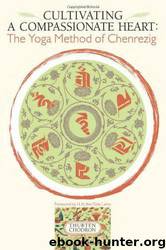Cultivating a Compassionate Heart: The Yoga Method of Chenrezig by Thubten Chodron & Dalai Lama

Author:Thubten Chodron & Dalai Lama
Language: eng
Format: azw3
Publisher: Snow Lion
Published: 2006-04-25T00:00:00+00:00
Whenever you're having a strong emotion-either an unpleasant emotion or a pleasant one-with one corner of your mind, look at the way "I" appears. Observe it. Don't intellectualize about it, saying in an academic voice, "Yes, I feel `I,' and it appears to be existing within the body and mind but separate from them. Now I understand the object to be negated." In actual fact, you haven't. You're just repeating the words from the text, but you still haven't identified the feeling of "I" in your mind. Don't describe it to yourself with words; rather become familiar with how this "I" appears.
Two Senses of Self
Psychologists talk about people who are co-dependent because they don't have a sense of self. What psychologists mean when they say a person has no sense of self is very different from what the Buddha meant by no-self or selflessness. People with psychological problems actually have a very strong sense of self in the Buddhist sense, although they may not in the psychological sense of the word. Psychologically, they don't see themselves as efficacious individuals in the world, but they still have a very strong sense of"I": "I am worthless." When somebody criticizes them, they don't like it. They get into co-dependent relationships to protect or to please this "I." When they fall into selfpity, their sense of an inherently existent "I" is very strong. Thus they still have self-grasping even though they lack a psychologically healthy sense of self.
Buddhism recognizes two kinds of sense of self. There's one sense of self that is healthy and necessary to be efficacious on the path. The object of this sense of self is the conventionally existent "I." The other sense of self grasps at an inherently existent self that never has and never will exist. Within Buddhism, when we talk about realizing emptiness, we're negating the false self, this self that appears inherently existent to us.
Download
This site does not store any files on its server. We only index and link to content provided by other sites. Please contact the content providers to delete copyright contents if any and email us, we'll remove relevant links or contents immediately.
The Way of Zen by Alan W. Watts(6584)
Ego Is the Enemy by Ryan Holiday(5400)
The Art of Happiness by The Dalai Lama(4118)
The Book of Joy by Dalai Lama(3964)
Why Buddhism is True by Robert Wright(3438)
Spark Joy by Marie Kondo(3289)
Shift into Freedom by Loch Kelly(3189)
Happiness by Matthieu Ricard(3034)
A Monk's Guide to a Clean House and Mind by Shoukei Matsumoto(2901)
The Lost Art of Good Conversation by Sakyong Mipham(2638)
The Meaning of the Library by unknow(2557)
The Unfettered Mind: Writings from a Zen Master to a Master Swordsman by Takuan Soho(2290)
The Third Eye by T. Lobsang Rampa(2255)
Anthology by T J(2201)
Red Shambhala by Andrei Znamenski(2180)
The Diamond Cutter by Geshe Michael Roach(2056)
Thoughts Without A Thinker: Psychotherapy from a Buddhist Perspective by Epstein Mark(2004)
Twilight of Idols and Anti-Christ by Friedrich Nietzsche(1886)
Advice Not Given by Mark Epstein(1873)
